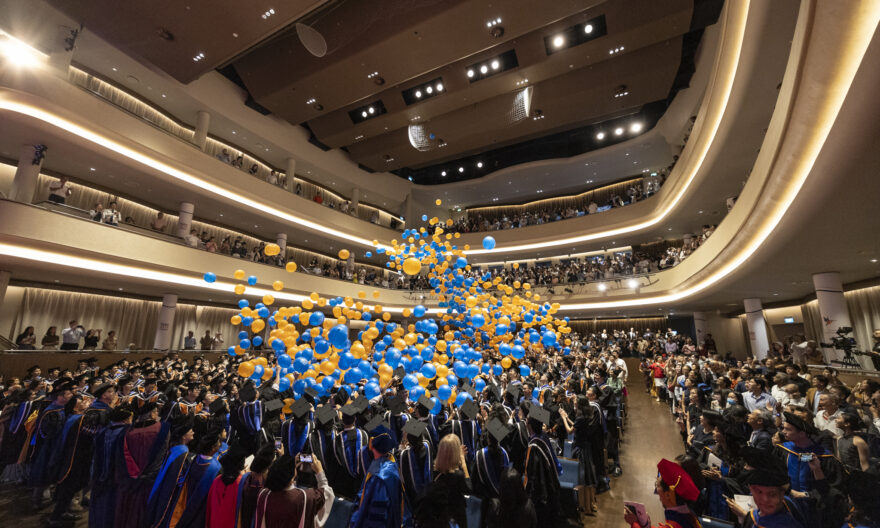Community-based student organisations come together to conduct community trails around Singapore

On 23 and 26 August 2017, Yale-NUS students embarked on four different visits to various community organisations around Singapore on an inaugural community trail. This was organised by ComPact, the Yale-NUS community service club, in collaboration with other community-based student organisations such as The G Spot and i’dECO, which focus on gender and environmental issues respectively.
According to Toh Wei Yang (Class of 2020), Vice-President (External) of ComPact, the series of community trails aimed to make community service a part of the Yale-NUS College identity.
“We thought that we could send a strong signal by doing something for the first-year students. At the same time, we had prior feedback that one of the primary obstacles for our students to participate in community service was the lack of information and opportunities. Hence, we thought that by collaborating, we could cover a wider spectrum of service opportunities and fill in the information gap. This is especially so for the international students,” he explained.
“We also wanted to debunk the notion that Singapore was the ‘perfect’ place to live in by highlighting social and ecological issues in the current space. Ultimately, we hope that this would translate to more interests in social issues and student-led initiatives subsequently on campus,” Wei Yang added.
The G Spot organised a visit to The T Project, a shelter for homeless transgender people, while the Yale-NUS Association for the Protection of Animals (YAPAC) organised a visit to the Animal Concerns Research and Education Society (ACRES).
YAPAC President Darrel Chang (Class of 2019) explained that the visit primarily sought to encourage participants to practise respect, kindness, and compassion for all life and expose them to the challenges in creating a world where humans and non-human animals could live in harmony.
“We wanted to introduce participants to significant local efforts in animal rescue and care as well as educate them on the appropriate behaviour and measures when they encounter animals, especially those in distress. We hope to inspire students to volunteer at animal shelters in the future,” he added.
The group spent about half an hour on a tour of ACRES’ wildlife rehabilitation sanctuary, where they learnt about the state of the illegal wildlife trade in Singapore. The remaining hour was spent on a presentation by ACRES staff on their organisation and how the public could help combat illegal trade, as well as a component on factory farming and cruelty-free living.
Wong Cai Jie (Class of 2021) was one of the participants of The G Spot’s community trail and was interested to visit The T Project after hearing about the group.
“Personally, the opportunity to visit the shelter was a chance to engage with one of the least visible and most disenfranchised communities in Singapore. I had hoped to learn about how I could contribute to the transgender community and I was glad that the visit did displace some of my preconceived notions with concrete information from the T Project itself,” she explained. She added that she also learnt the importance of considering the specific needs of individuals at a basic level.
Similarly, Ritika Biswa (Class of 2018) was interested to learn more about the transgender community, which remains very invisible in Singapore. “I wanted to abate my ignorance regarding this community and their specific challenges in Singapore,” she said.
i’dECO, the Yale-NUS sustainability movement, organised a visit to learn about the unique organic farming methods in Singapore at Quan Fa Organic Farm and the Community-in Bloom garden at Jurong Central Sky Garden.
At the garden, the students assisted in farming activities such as weeding, harvesting and rehoming plants. The Sky Garden is a Community-in-Bloom garden, which was an initiative started by the National Environment Agency in 2005 to make Singapore an even greener garden city.
For Yu Zihan (Class of 2021), this was an opportunity to learn about something that had only existed to him before as a concept. “I wanted to learn how urban farming was like in real-life and how it is sustained by Singaporean communities,” she shared.
“I learnt about making use of common and accessible compost such as coffee powder, which I think we can use in our school’s urban farm to fertilise the soil. Also, I learnt some farming techniques such as alternating the growth of different plants which could be a useful technique to adopt since the plants will be left unattended during the winter break,” she added. After the visit, Zihan plans to continue to contribute to i’dECO’s composting and farming teams on campus.
Reflecting on the experience, Wei Yang shared that this event was a first step towards more collaboration between student organisations, which could potentially deliver more impact and visibility to their work and that of the other student organisations.
In addition, he noted that many participants indicated that they had seen a side of Singapore that they never knew existed, which assured the team that their objectives had been achieved. The team also hopes to continue to organise such an event at the beginning of each academic year to introduce students to different communities and service opportunities in Singapore.





